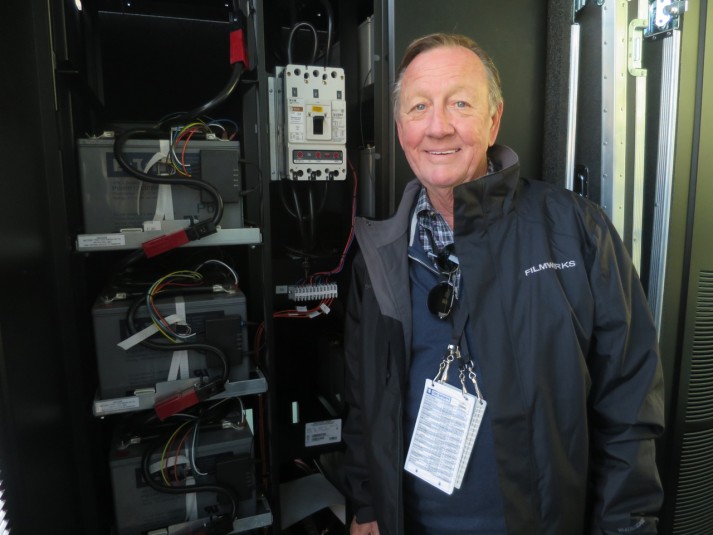Filmwerks Takes Next-Step in Compound Power Generation for Super Bowl 50
Story Highlights
Super Bowl 50 signaled a major advance in big-time sports power and backup support as CBS Sports relied on a new system from Filmwerks that relied on shore power to power batteries that basically provided a massive UPS (uninterruptable power supply) for CBS Sports that ensured that even if shore power was lost CBS Sports would stay on air.

Mike Satrazemis, CEO of Filmwerks, with the batteries that were at the core of CBS Sports backup power plans.
Mike Satrazemis, Filmwerks, CEO, says the system ultimately is about redundancy but also saving money as it only requires diesel fuel to be burned when there is no shore power. The shore power charges the batteries and if shore power is lost the compound is powered by the batteries that bridge the gap between losing shore power and running on diesel generators.
The system on hand at Super Bowl 50 was comprised of 144 12-volt batteries that provided 485 volts of DC power that was converted into 208 volts, three phase, of AC power.
“That is the ideal voltage we want out of a utility,” explains Satrazemis. “So we are taking AC power from the utility, converting it to DC power for the batteries, and then back to AC power to power whatever it is needs to be powered.”
Satrazemis says the power system on hand at Super Bowl 50 was the culmination of two years of work. The first time it was put to use was last August for ESPN’s coverage of the U.S. Open albeit on a much smaller scale.
“We kept pouring time and effort into it and got it to point where we could do an event,” he explains. “ESPN embraces technology so we worked together with ESPN’s Chris Strong to prove the concept worked at the U.S. Open last August. That system was not as big as this one was but it was used in multiple positions throughout the Billie Jean King Tennis Center.”
The system is also completely scalable as a client can add more battery power to extend the amount of time the compound can go without either shore power or diesel power.
“For example, we overdid it in the booth for the Super Bowl because there is no alternative source of power,” explains Satrazemis. “We had 90 minutes worth of battery power so if everything went black we would be able to maintain power and CBS Sports could cover the black.”
Satrazemis says that even 30 minutes of backup is an extraordinary long period of time as typically the compound only needs about 30 seconds of battery backup so that it can make the transition from shore power to generator power or generator to shore power without any hiccups.
“The system is monitored so that if a specific parameter is reached it will send a signal to an automatic transfer switch that then sends a signal back to the diesel generator so it starts immediately,” says Satrazemis. “During the interim needed for the generator to get running the batteries are running the entire show and being depleted.”
The batteries are built by a company that builds batteries for airliners and space stations so they are designed for mission-critical applications like a major sports event.
“We know how to harvest electricity but it is storing it and using it when you want to on demand that is the challenge,” says Satrazemis.
That is one of the reasons Satrazemis and the Filmwerks team are already hard at work on the next generation of the system, one that will use Lithium Ion batteries.
“They are more expensive but they also don’t have the maintenance issues with respect to temperature and environment,” he says. “Lithium is much more forgiving so we can package them together where it makes sense to use them.”
